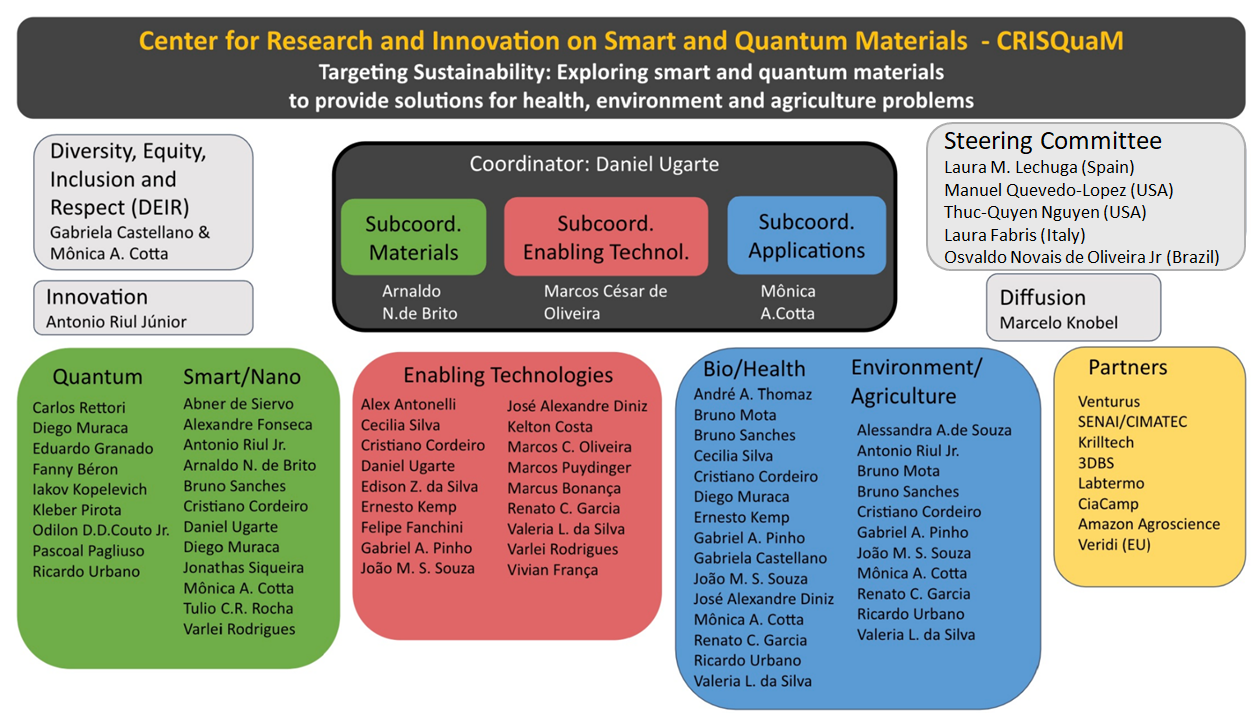BV-FAPESP: research projects supported in this Center
CRISQuaM in the Media: news about the center
CRISQuaM aims to explore the synergistic development of fundamental and applied science to create new materials with high potential for the construction of devices and sensors to address technological challenges related to sustainability, climate change, precision agriculture, ecology, and health. To achieve these goals, we have assembled an interdisciplinary and collaborative research team, integrating expertise across various scientific domains, researching novel materials with high innovation potential. By combining original synthesis methods, advanced characterization techniques, theoretical approaches, computational simulations, quantum technologies, and device construction designs, we aim to drive advances in smart and quantum materials, promoting scientific excellence and technological development. With this, we plan disruptive innovations in instrumentation—including hardware and AI-based tools—as well as in quantum technologies, biomedical devices, and signal processing, in addition to plant bionics, exploring plant-pathogen interactions. Besides research activities, we plan intensive actions in education, dissemination, and communication for the general public, as a modern society should be aware of the challenges humanity faces and how research and technology are essential for responsibly utilizing the planet's limited resources. CRISQuaM's Innovation activities are accelerated through partnerships with several companies in related technologies, many of them Brazilian. Finally, all activities of the Center are managed in accordance with diversity, equity, and inclusion goals and best practices.
The Center brings together scientists, engineers, and innovators in a collaborative effort to apply materials science and quantum technologies at the cutting edge, designing new materials and nano(bio)sensors for advanced diagnostics. The Center has a team capable of producing a wide range of (nano/micro) materials, along with precise chemical and physical characterizations using modern techniques (synchrotron, advanced microscopy, magnetotransport, magnetic resonance, optics, etc.). In addition, the team offers various options in enabling technologies, including miniaturization, processing, and additive manufacturing, as well as instrumentation, quantum sensing, and electronics development. Data analysis will employ updated approaches (numerical simulation, classical and quantum machine learning, and quantum optimization). Applications at the knowledge frontier will address urgent sustainability needs in environmental areas, precision agriculture, plant bionics, and biomedical interfaces, contributing to the development of local technologies in close partnership with the Brazilian industry.
The organization of the Center is based on three pillars — Materials, Enabling Technologies, and Applications — together with partner companies, as described in the figure below.

2024-11-27
The strategy developed at the State University of Campinas consists of submitting the ingredient to heat treatment and combining it with guarana extract and vitamin D. The result could become an alternative to animal products.
2024-11-27
Researchers at the University of São Paulo analyzed data from 89 mother-father-baby triads and concluded that the higher the father’s body mass index, the smaller the baby, and that this can influence the baby’s health far into adulthood.
2024-11-25
WHO advisory group publishes first article in scientific journal outlining challenges and actions that can help make the field more equitable and promote progress in the prevention, diagnosis and treatment of various diseases, including rare ones.
2024-11-25
The Guarani Aquifer is the source of drinking water for some 90 million people and is being overused in several areas of São Paulo state (Brazil). The researchers deployed stable isotopes to estimate the relative contributions of rainwater and groundwater to the maintenance of springs in the region.
2024-11-25
Researchers from the University of Oxford and the State University of Campinas have discovered a neuropeptide that acts on the peripheral nervous system, outside the brain, to speed up metabolism. The finding opens the way to more efficient and cheaper treatments for obesity.
2024-11-20
The use of biofuels in Brazil and other developing countries can avoid some 400 million metric tons of greenhouse gas emissions from the transportation sector by 2030, according to a report produced by an International Energy Agency task force led by researchers affiliated with the FAPESP Bioenergy Research Program.